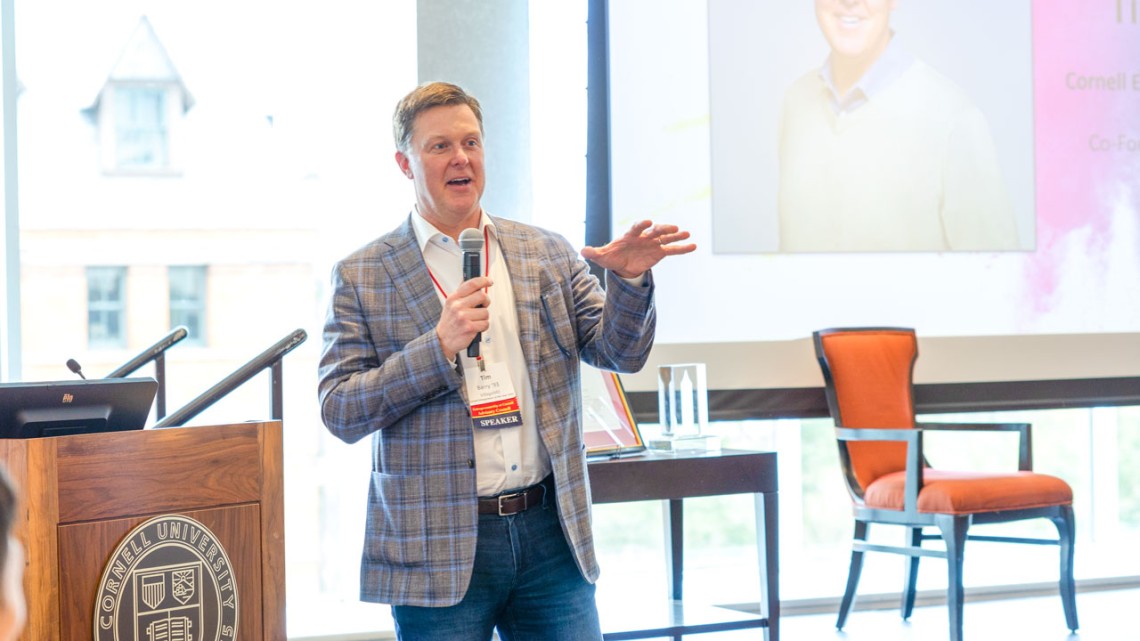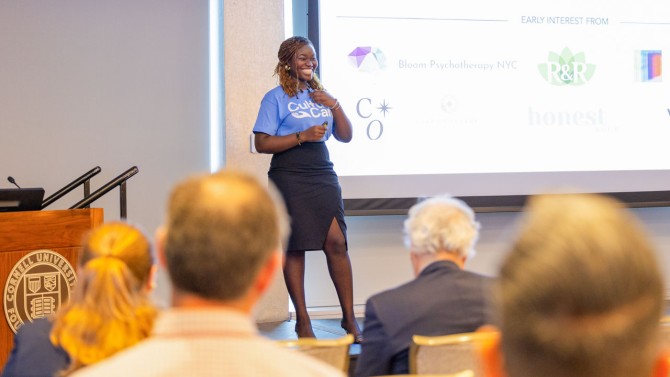
Tim Barry ’93 spoke about his career journey April 12 when he was honored as 2024 Cornell Entrepreneur of the Year.
Entrepreneurship Celebration honors alumni, student innovators
By Kathy Hovis
More than 300 people joined in two days of campus activities celebrating Cornell entrepreneurs April 11-12, including events to honor Tim Barry ’93 as the 2024 Cornell Entrepreneur of the Year.
Entrepreneurship at Cornell’s Celebration event also included speakers and events exploring everything from artificial intelligence to tech startup investing to building a more inclusive entrepreneurial community.
“Our annual event gives alumni the chance to witness the entrepreneurial energy we see on campus every day in classes and in our many entrepreneurial initiatives and organizations,” said Zach Shulman ’87, J.D. ’90, director of Entrepreneurship at Cornell. “Plus, we were honoring Tim Barry, who really is a model Cornell Entrepreneur of the Year. His passion for fixing our nation’s health care system is palpable and genuine.”
Barry, founder and CEO of VillageMD, shared the story of the highs and lows of his entrepreneurial journey.
“We wanted to touch a sentiment in the marketplace that so many physicians feel – I’m on this hamster wheel and I’m not given the chance to deliver the kind of care I went to medical school for,” Barry said. “I want something better. I want to focus on the best outcome for my patient, not whether I referred my patient to my hospital’s cardiology group to keep them in the ‘family.’”
The 4,000 doctors who work with VillageMD in 16 markets are “maniacally” focused on delivering the best care for patients, Barry said, by working collaboratively with nutritionists, pharmacists, social workers and patients themselves, especially those with chronic conditions.
“There’s a level of health equity that’s nonexistent in our health care system and we’re trying to address that,” he said. “Our 20,000 employees are out there every day trying to really see people, to understand people. We use the word “love” a lot in our company because people need to feel loved.”
Master’s student Will Hasapis came to hear Barry’s speech because, he said, VillageMD is doing work he believes in.
“It is really inspiring to hear him talk about this kind of thing,” Hasapis said. “Even though our current health care system is a sad reality, it’s good to know there are people out there making change right now and who think that change is possible.”
eLab Demo Day, another Celebration highlight, was one of the April 11 events, where 17 teams from the student business accelerator shared their progress from this year. Teams were selected in the fall from among 80 applicants and have spent the year taking classes, participating in mentoring opportunities, practicing pitches and doing customer discovery, marketing and sales as they grow their businesses.
“To start a business is hard, you have to pick a great problem, build a great team, work for a long time on a lot of versions of your idea that don’t work out,” said Krystyn Van Vliet, vice president for research and innovation at Cornell and professor of materials science and engineering, who welcomed the crowd to the event and said they were in the right place to develop their ideas. “People at Cornell really live the mission that the time that you spend conducting research – trying to turn it into research outcomes that change the world – should be for the greatest good.”
Student teams presented businesses that offered everything from food products to software to agricultural production systems. For example, Phytoflock, created by MBA student Albert Charles, uses grape-based waste as a chicken supplement to reduce the need for antibiotics. CranioMag, founded by Weill Cornell Medicine student Kyle Zappi, is creating a less-invasive device for use in correcting craniosynostosis, a birth defect impacting a baby’s skull growth.
On Friday, participants took part in various morning panels, including one focused on startups that have launched from university-led research.
“I feel so proud to hear how Cornell supports entrepreneurs and to hear how valuable and important these new products are,” said Marilyn Laverty ’76, a philosophy major in the College of Arts and Sciences and a member of the Advisory Council for Entrepreneurship at Cornell. She said she became an “accidental entrepreneur” after being a publicist for a major record label and then starting her own firm, Shore Fire Media.
“I think for students in this generation, the idea of doing something adventurous or doing something for themselves is not at all as frightening as it may have been for us of another generation.”
During Friday’s lunch, Aunt Flo’s Kitchen, founded by computer science major Armita Jamshidi ’25, was named the 2024 Student Business of the Year, and Esger, a company whose CEO is Advait Raykar MEng ’23, was named the winner of the BenDaniel Venture Challenge.
The final event for the conference was the “Inspiring Futures” reception, organized by Cornell’s Center for Technology Licensing (CTL) and a group of staff who received a grant from the President’s Council of Cornell Women. At the reception, participants were encouraged to think about the challenges founders face and brainstorm ways they can personally create a more inclusive entrepreneurial community.
“We held the gathering to raise awareness about the opportunities available to Cornell founders, encourage broader access and participation and ensure aspiring entrepreneurs feel supported,” said Lynda Inseque, director of technology and venture initiatives and engagement at CTL.
LeeAnn Roberts, director for diversity, equity and inclusion for the Cornell Ann S. Bowers College of Computing and Information Science, said the event helped business leaders think about diversity, equity and inclusion in a new way. “This gave us a way to bring in those ideas to the conversation about entrepreneurship – diversity of ideas, diversity of thought, diversity of products, serving diverse communities,” she said.
Participants brainstormed actions that both the university and they personally could take to support and encourage minoritized groups in entrepreneurship and diversify the entrepreneurial ecosystem at Cornell. Prizes included bags filled with products created by Cornell founders.
“As Cornell works toward Zach’s [Shulman’s] vision of Cornell becoming a top-three destination for entrepreneurially-minded students” said Christa B. Downey, director of the Cornell Engineering Career Center, “there is great opportunity to lead the way through supporting diverse groups of founders, which will ultimately lead to greater innovation and impact.”
Kathy Hovis is a writer for the College of Arts and Sciences.
Media Contact
Adam Allington
Get Cornell news delivered right to your inbox.
Subscribe

